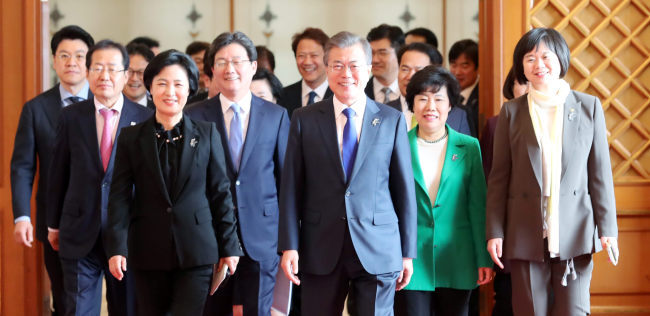President Moon Jae-in reiterated Wednesday that South Korea won't settle for anything short of the ultimate goal of the denuclearization of North Korea.
During a meeting with party leaders, Moon also said he has no plan to ease sanctions against Pyongyang for the sake of his summit with North Korean leader Kim Jong-un slated for late next month.
Moon hosted the lunch meeting with the leaders of five political parties, including the ruling Democratic Party and the main opposition Liberty Korea Party, to explain the results of his special envoys' two-day visit to the North this week.
"Our goal is denuclearization. We cannot settle for nonproliferation or a nuclear freeze," Moon was quoted by party officials as saying.
"The dismantlement of the (North's) nuclear program is the end goal. But given that the immediate dismantlement of it may be difficult, I think we can go through a certain road map before reaching that dismantlement stage."
Moon is seen as pursuing a phased strategy to denuclearize the North that involves the North's initial moratorium on nuclear and missile tests before the dismantlement of its nuclear program. His critics argue that Seoul could settle for a nuclear freeze or end up allowing Pyongyang to be recognized as a nuclear power.
Asked if Seoul proposed any phased approach during his envoys' visit, Moon said no.
 |
President Moon Jae-in (third from right) and leaders of five major political parties enter to hold a meeting at his office Cheong Wa Dae in Seoul on Wednesday. (Yonhap) |
During the envoys' visit, the two Koreas agreed to hold the summit in late April and set up a hotline between their leaders. The North has also shown its willingness to talk with the United States about its denuclearization and pledged not to use military weapons, either nuclear or conventional, against the South.
Commenting on what will be the third inter-Korean summit, Moon said he may not be able to find much common ground with the North's reclusive leader.
"The summit will take place against the backdrop of international sanctions and pressure," he said. "The room (for cross-border agreements) at the summit will become broader when there is progress in dialogue between the US and the North."
Aware of the worries that cross-border rapprochement could weaken unilateral and international sanctions against the North, Moon said that Seoul cannot unilaterally lift them.
"The ongoing sanctions and pressure against the North are UN Security Council sanctions and unilateral sanctions imposed by the US," he said. "The South Korean government is not in a position to unilaterally unravel the standalone sanctions among others."
Moon also rejected speculation that there were secret agreements his envoys reached with the North during their trip to Pyongyang.
"There were never secret agreements," he said.
He stressed the importance of cooperation with Washington in the efforts to foster peace.
"I believe denuclearization talks will materialize when the South and the U.S. are on the same page," he said.
In response to a request for an apology for accepting Kim Yong-chol, a controversial North Korean official, as the head of the North's delegation to the closing ceremony of the PyeongChang Winter Olympics, Moon said it was an "inevitable" measure to foster inter-Korean dialogue. Kim has been accused of masterminding two attacks in 2010 that killed 50 South Koreans in total.
"I seek your understanding," Moon said. (Yonhap)








